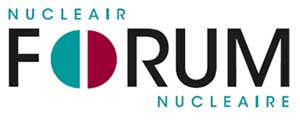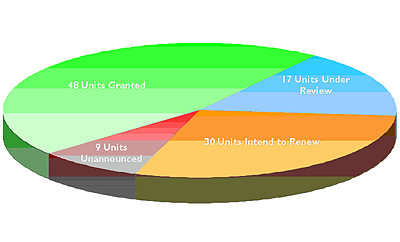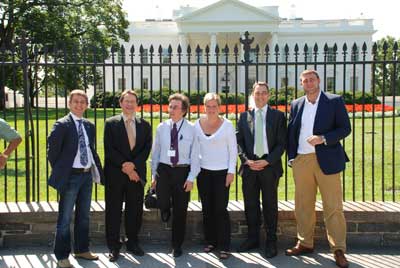
European
Nuclear Society
e-news
Issue 22 Autumn 2008
http://www.euronuclear.org/e-news/e-news-22/nuc-forum.htm


As part of its mission to inform the public and decision makers on the peaceful applications of nuclear energy, the Belgian Nuclear Forum has been organizing yearly study trips for national press and politicians for 20 years.
For 2008, the lifetime extension of nuclear power plants was chosen as the central theme of the trip. For several reasons, the United States offered the ideal ‘frame of reference’ to explore the subject: by the end of August 2008, of the 104 American reactors, 48 had obtained a licence renewal and the files of 17 others were being studied. The procedure should be launched for 30 other reactors by 2013.

Furthermore, 5 out of the 7 Belgian pressurized water reactors are of American (Westinghouse) design, while the 2 other (Framatome) reactors were built under Westinghouse license. Also, the US nuclear regulation served as model for Belgian regulation and was transposed into Belgian law.

So, on 7 September 2008, a delegation of 7 Belgian MPs, 1 representative of the Flanders Chamber of Commerce & Industry and 4 journalists, accompanied by representatives of the Forum’s member organisations, left for the US. First stop, Pittsburgh, home base of Westinghouse Electric Company, to learn about the opportunities and challenges that lifetime extension creates for the reactor manufacturer. How it specifically challenges plant operators was discussed afterwards at the Beaver Valley Plant, near Pittsburgh (the reference plant for 3 Belgian nuclear units), where the delegation was also given a guided tour.
The next stop was Washington D.C. There the group met with the United States Nuclear Regulatory Commission (NRC), mainly to learn about the licence renewal process. In the US, the initial criteria for the issue of a 40-year licence were not linked to technical or safety issues at all. American legislation had set this limit for essentially economic and anti-trust reasons. An operating license is only extended at the request of the commercial operator, who assesses voluntarily whether it is economically justified to continue operation. To help it do this, it can use the NRC analysis grid and can, therefore, include the required investment due to its extended calculations. The procedure consists of two main components: a study of safety problems and a study of environmental problems.
For the delegation, it became clear after the meetings with the nuclear operators and NRC that both parties are satisfied with the procedures followed in the United States for the extension of operating licenses. Normalisation has allowed relatively short procedural time-frames. As the NRC has continually improved the procedure over ten years, it is obvious that the American experience and the high degree of standardisation of the procedure could be exploited beneficially elsewhere in the world.
The meeting with NRC was followed by a very relevant evening lecture hosted by AREVA NP Inc., which gave an insight into US energy market functioning, and how it impacts nuclear energy and creates opportunities for reactor manufacturers such as AREVA.
The trip concluded with a visit to the Nuclear Energy Institute. As the policy organization for the entire US nuclear technologies industry, the Institute not only gave a concluding overview on the issue of license renewal, but also addressed subjects such as public opinion and public policy. This allowed discussion on crucial issues such as used fuel management and waste, which were clearly major concerns for the delegation.

Judging by the commitment of the delegation members and the trip’s resultant spin-offs, it is clear that the Belgian Nuclear Forum can offer decision-makers, the press and the industry a unique framework for exchanging views and revising its opinions. The Forum hopes that the conclusions of this trip will give a more solid basis to the public debate on the nuclear phase-out in Belgium.
![]()
© European Nuclear Society, 2008